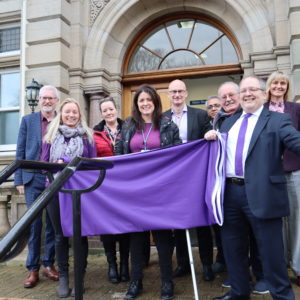
In recent years, the colour purple has been increasingly associated with disability, symbolising a new positive narrative about the contribution of disabled people in the workforce and the wider community.
Just as the rainbow flag has created a new conversation and increasingly vibrant LGBT movement, the use of the colour purple can help in the effort to build communities, challenge outdated perceptions and prejudices and inspire others.
The United Nations has designated today, 3rd December as the International Day of Disabled People. Every year, since 1992, disabled people, organisations and governments all over the world have celebrated this day in a wide variety of ways. The UN’s theme for this year is ‘Promoting the participation of persons with disabilities and their leadership’.
Engagement is key to ensuring equality and diversity not only in terms of working with communities on service delivery to identify needs and aspirations, to plan and transform services, but it is also important that staff feel engaged, listened to and valued.
‘Nothing about us without us’ is a slogan that came into use in disability activism in the 1990s. Its arrival and then disability discrimination legislation a quarter of a century ago has helped services to move away from the medical model of disability where there is a focus upon the individual and their impairment, to the social model of disability which identifies systemic barriers, negative attitudes and exclusion by society (purposely or inadvertently) that mean society and how it is organised is the main contributory factor in disabling people.
It is this ethos which has shaped the introduction of the Workforce Disability Equality Standard (WDES) this year. The WDES is important, because research shows that a motivated, included and valued workforce helps to deliver high quality patient care, increased patient satisfaction and improved patient safety.
One way that Cumbria, Northumberland, Tyne and Wear NHS Foundation Trust (CNTW) is ensuring inclusion of its disabled workforce is through our disabled staff network. The group has for the past couple of years been providing support to disabled staff, but is now starting to influence Trust Policy.
Work is taking place that will be done in partnership with the network to improve how we deliver reasonable adjustments in the Trust. The network will help shape actions in response to the WDES.
It is really important that we know the number of disabled staff that we employ to help us to work out what changes we might need to make, what support we might be able to offer staff and monitor our policies and practices so that we can ensure disabled staff have the right level of support and help.
To update your electronic staff record with any disability you may have (for statistics and support suggestions only), please click here. To find out more about the Disabled Staff Network please contact [email protected]
